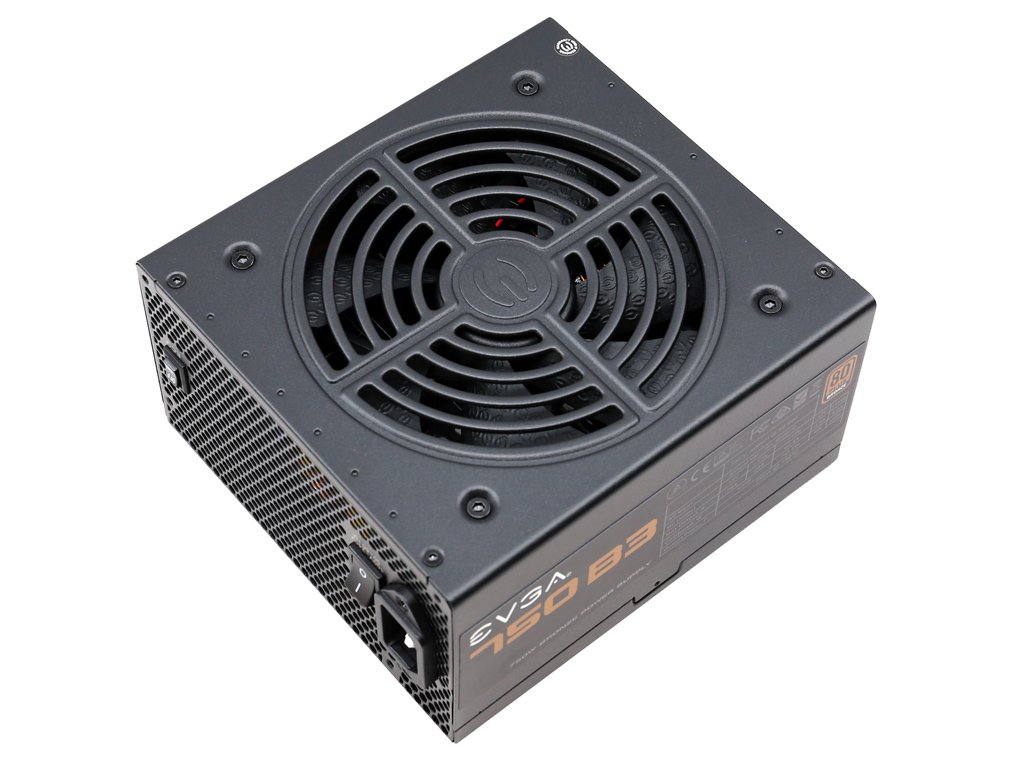Evga 750 Bq 80 Bronze 750w Continuous Wattage
Early Verdict
Another B3 unit is added into our broken samples gallery and this is a great shame given that this PSU is based on a modern platform, which however features mediocre build quality. The over power protection is critical to any PSU and we expect EVGA and Super Flower to address this issue, which seems to affect most B3 models, the sooner the possible.
Pros
- +
Affordable
- +
Full power at 47°C
- +
Ripple suppression
- +
Load regulation
- +
Hold-up time
- +
Accurate Power Ok signal
- +
Silent enough
- +
Fully modular
- +
5-year warranty
- +
Selectable semi-passive operation
Cons
- -
Didn't start again after the OPP test
- -
Efficiency
- -
Soldering quality
- -
3.3V Transient Response
- -
Sleeve bearing fan
- -
Short distance among the peripheral connectors
- -
Packaging protection
- -
Single EPS connector
Features & Specifications
EVGA teamed up with Super Flower, its favorite OEM, to create the B3 family. Designed to go up against Corsair's CX-M series, the B3 PSUs offer modular cabling, semi-passive operation, and similar efficiency levels. They're all based on older Leadex platforms manufactured by Super Flower itself. The higher-capacity B3 models (750 and 850) use an upgraded platform equipped with Japanese caps, while the lower-capacity B3 models employ a more budget-friendly platform armed with Teapo caps on the secondary side to cut costs a bit. Both platforms are highly capable. However, it's crystal clear that Super Flower didn't tune them optimally. The result is that those PSUs easily fail under the right (or wrong) conditions where power output exceeds rated capacity.
Normally, every power supply utilizes over-power protection to keep it from breaking down if it's pushed to deliver more power than its components can handle. But in the three different EVGA B3s we've tested, OPP is set improperly, resulting in their untimely demise. Of course, it's a shame to see a capable platform suffer such a serious flaw. But these are all retail samples, straight from store shelves, so they represent what you'd encounter from EVGA, too.

The 750 B3 is this family's second-strongest model, intended for budget-oriented builders who don't really care about efficiency, but need compelling performance with a long warranty. It's equipped with a semi-passive mode to achieve silent operation under light loads. That's an uncommon feature from a low-efficiency power supply, since increased thermal loads typically force some sort of active cooling. Despite the B3 series' conservative efficiency rating, though, these PSUs still demonstrate higher efficiency levels than their competition. So a semi-passive mode that doesn't compromise reliability is certainly plausible.
Specifications
It is nice to see a 50°C temperature rating for continuous full power output, as the ATX spec demands. In our experience, though, most PSUs will fail if they are asked to provide 100% power at such high temperatures for a long time. Best-case, over-temperature protection kicks in to save the day (if it's supported, of course). EVGA claims that the 750 B3 does, in fact, include OTP. But we'll have to take the company's word for it, since our sample failed before we could complete its protection features testing.
The 750 and 850 B3 models are physically larger than their lower-capacity siblings, a clear indication that they use a slightly different platform. The same fan cools them all, though, measuring 130mm across. Finally, EVGA's warranty is generously long for this mainstream category, at five years.
Power Specifications
| Rail | 3.3V | 5V | 12V | 5VSB | -12V | |
|---|---|---|---|---|---|---|
| Max. Power | Amps | 24 | 24 | 62.4 | 3 | 0.5 |
| Watts | 120 | 748.8 | 15 | 6 | ||
| Total Max. Power (W) | 750 | |||||
The +12V rail can deliver more than 62A, while the minor rails serve up to 120W combined power; they'll easily support any modern system. The 5VSB rail also has enough juice, given its 15W overall capacity.
Cables And Connectors
| Modular Cables | |||
|---|---|---|---|
| Description | Cable Count | Connector Count (Total) | Gauge |
| ATX connector 20+4 pin (600mm) | 1 | 1 | 18-22AWG |
| 4+4 pin EPS12V (600mm) | 1 | 1 | 18-22AWG |
| 6+2 pin PCIe (550mm+150mm) | 2 | 4 | 18-22AWG |
| SATA (500mm+100mm+100mm) | 2 | 6 | 18-20AWG |
| Four-pin Molex (500mm+100mm+100mm) | 1 | 3 | 18AWG |
| FDD Adapter (+105mm) | 1 | 1 | 20AWG |
It is a shame to see a 750W PSU with just one EPS connector. EVGA clearly doesn't intend for its 750 B3 to power high-end systems, though. If you need a couple of EPS connectors, look to the G3 line instead.
You get a decent number of PCIe connectors, but we'd like to see more SATA connectors. It'd also be nice to have at least four four-pin Molex connectors.
Although the main ATX cable is long enough, we'd suggest that EVGA use at least a 65cm-long EPS cable. Also, the distance between peripheral connectors is not large enough at 10cm.
Power Distribution
Since this PSU features a single +12V rail, we do not have anything to say about its power distribution.
MORE: Best Power Supplies
MORE: How We Test Power Supplies
MORE: All Power Supply Content
iversonpeartrut1989.blogspot.com
Source: https://www.tomshardware.com/reviews/evga-750-b3-power-supply,5229.html
0 Response to "Evga 750 Bq 80 Bronze 750w Continuous Wattage"
Post a Comment